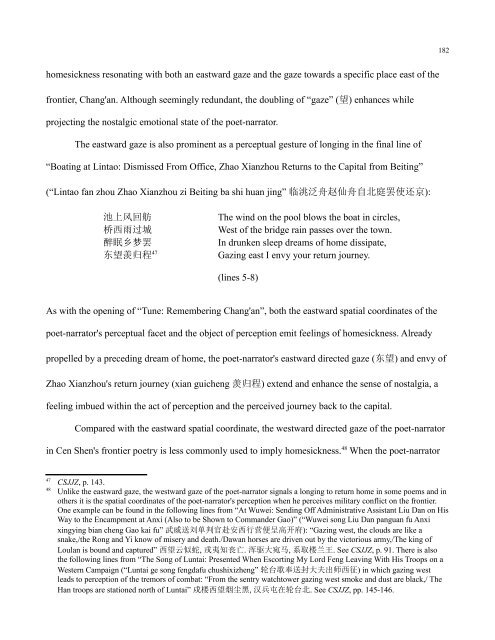View/Open - University of Victoria
View/Open - University of Victoria
View/Open - University of Victoria
You also want an ePaper? Increase the reach of your titles
YUMPU automatically turns print PDFs into web optimized ePapers that Google loves.
182<br />
homesickness resonating with both an eastward gaze and the gaze towards a specific place east <strong>of</strong> the<br />
frontier, Chang'an. Although seemingly redundant, the doubling <strong>of</strong> “gaze” ( 望 ) enhances while<br />
projecting the nostalgic emotional state <strong>of</strong> the poet-narrator.<br />
The eastward gaze is also prominent as a perceptual gesture <strong>of</strong> longing in the final line <strong>of</strong><br />
“Boating at Lintao: Dismissed From Office, Zhao Xianzhou Returns to the Capital from Beiting”<br />
(“Lintao fan zhou Zhao Xianzhou zi Beiting ba shi huan jing” 临 洮 泛 舟 赵 仙 舟 自 北 庭 罢 使 还 京 ):<br />
池 上 风 回 舫<br />
桥 西 雨 过 城<br />
醉 眠 乡 梦 罢<br />
47<br />
东 望 羡 归 程<br />
The wind on the pool blows the boat in circles,<br />
West <strong>of</strong> the bridge rain passes over the town.<br />
In drunken sleep dreams <strong>of</strong> home dissipate,<br />
Gazing east I envy your return journey.<br />
(lines 5-8)<br />
As with the opening <strong>of</strong> “Tune: Remembering Chang'an”, both the eastward spatial coordinates <strong>of</strong> the<br />
poet-narrator's perceptual facet and the object <strong>of</strong> perception emit feelings <strong>of</strong> homesickness. Already<br />
propelled by a preceding dream <strong>of</strong> home, the poet-narrator's eastward directed gaze ( 东 望 ) and envy <strong>of</strong><br />
Zhao Xianzhou's return journey (xian guicheng 羡 归 程 ) extend and enhance the sense <strong>of</strong> nostalgia, a<br />
feeling imbued within the act <strong>of</strong> perception and the perceived journey back to the capital.<br />
Compared with the eastward spatial coordinate, the westward directed gaze <strong>of</strong> the poet-narrator<br />
in Cen Shen's frontier poetry is less commonly used to imply homesickness. 48 When the poet-narrator<br />
47<br />
CSJJZ, p. 143.<br />
48<br />
Unlike the eastward gaze, the westward gaze <strong>of</strong> the poet-narrator signals a longing to return home in some poems and in<br />
others it is the spatial coordinates <strong>of</strong> the poet-narrator's perception when he perceives military conflict on the frontier.<br />
One example can be found in the following lines from “At Wuwei: Sending Off Administrative Assistant Liu Dan on His<br />
Way to the Encampment at Anxi (Also to be Shown to Commander Gao)” (“Wuwei song Liu Dan panguan fu Anxi<br />
xingying bian cheng Gao kai fu” 武 威 送 刘 单 判 官 赴 安 西 行 营 便 呈 高 开 府 ): “Gazing west, the clouds are like a<br />
snake,/the Rong and Yi know <strong>of</strong> misery and death./Dawan horses are driven out by the victorious army,/The king <strong>of</strong><br />
Loulan is bound and captured” 西 望 云 似 蛇 , 戎 夷 知 丧 亡 . 浑 驱 大 宛 马 , 系 取 楼 兰 王 . See CSJJZ, p. 91. There is also<br />
the following lines from “The Song <strong>of</strong> Luntai: Presented When Escorting My Lord Feng Leaving With His Troops on a<br />
Western Campaign (“Luntai ge song fengdafu chushixizheng” 轮 台 歌 奉 送 封 大 夫 出 师 西 征 ) in which gazing west<br />
leads to perception <strong>of</strong> the tremors <strong>of</strong> combat: “From the sentry watchtower gazing west smoke and dust are black,/ The<br />
Han troops are stationed north <strong>of</strong> Luntai” 戍 楼 西 望 烟 尘 黑 , 汉 兵 屯 在 轮 台 北 . See CSJJZ, pp. 145-146.
















